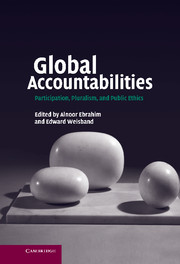Book contents
- Frontmatter
- Contents
- List of tables
- List of figures
- Acknowledgments
- List of contributors
- 1 Introduction: forging global accountabilities
- Part I Public accountability: participatory spheres from global to local
- Part II Experiments in forging NGO accountability: mutuality and context
- Part III Reflective accountability: new directions for participatory practices
- Part IV Global accountability frameworks and corporate social responsibility
- 11 Financial actors and instruments in the construction of global corporate social responsibility
- 12 Public accountability within transnational supply chains: a global agenda for empowering Southern workers?
- 13 Tripartite multilateralism: why corporate social responsibility is not accountability
- 14 Conclusion: prolegomena to a postmodern public ethics: images of accountability in global frames
- Index
- References
14 - Conclusion: prolegomena to a postmodern public ethics: images of accountability in global frames
Published online by Cambridge University Press: 22 September 2009
- Frontmatter
- Contents
- List of tables
- List of figures
- Acknowledgments
- List of contributors
- 1 Introduction: forging global accountabilities
- Part I Public accountability: participatory spheres from global to local
- Part II Experiments in forging NGO accountability: mutuality and context
- Part III Reflective accountability: new directions for participatory practices
- Part IV Global accountability frameworks and corporate social responsibility
- 11 Financial actors and instruments in the construction of global corporate social responsibility
- 12 Public accountability within transnational supply chains: a global agenda for empowering Southern workers?
- 13 Tripartite multilateralism: why corporate social responsibility is not accountability
- 14 Conclusion: prolegomena to a postmodern public ethics: images of accountability in global frames
- Index
- References
Summary
Incommensurability and accountability interpretivism
Inevitably, at the conclusion of a volume such as this, the question arises as to whether the experiences recounted, the narratives told, the conclusions enumerated, and the meanings derived, contribute to the development of an integrated framework. Such a framework would purport to allow us to ground broad generalizations of either practical use or theoretical value. The chapters included here stand together, however, in opposition to the construction of a neat package of conclusive findings and definitive lessons. Our very emphasis on global accountabilities broadcasts our antipathy towards modernist presumptions that project meta-narratives onto local histories, cultural traditions, and participatory or institutional practices. Suggesting, for example, that accountability involves “transparency,” “answerability,” “compliance,” and “enforcement” in “account-giving,” is appropriate in certain circumstances. But to assume from this that common understandings exist – either with respect to the applied meanings of this lexicon or with regard to the values served by their application across a range of diverse political communities – runs the risk of fixating the viewer's understanding of accountability before one has examined who “performs” accountability and how, where, why, under what conditions, and with what effects.
Such an analytical stance, grounded in a priori assumptions that tend to reduce cultural significations to axiomatic and homogenized generalizations, has afflicted the study of global accountability in comparative contexts.
- Type
- Chapter
- Information
- Global AccountabilitiesParticipation, Pluralism, and Public Ethics, pp. 307 - 339Publisher: Cambridge University PressPrint publication year: 2007



